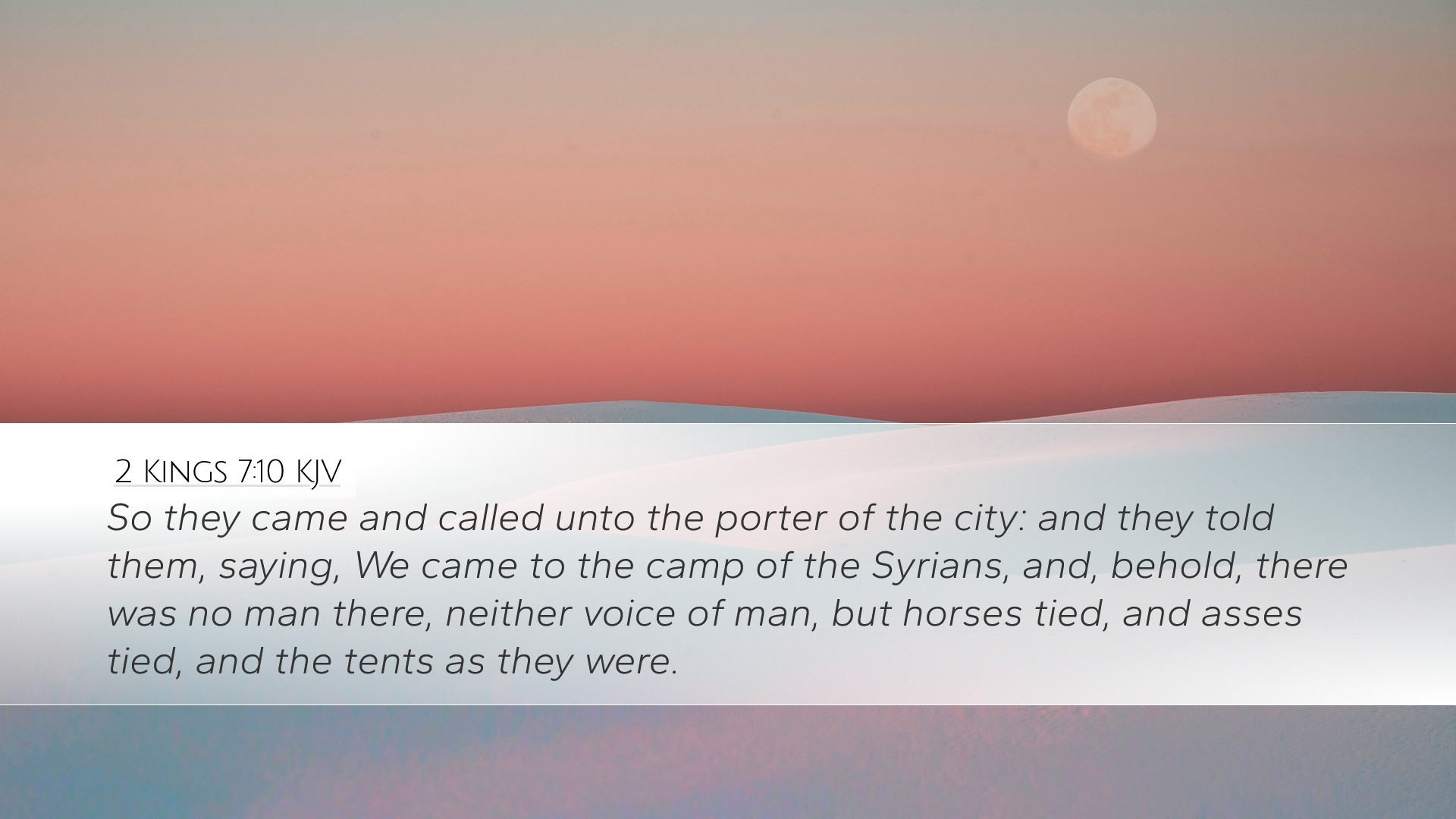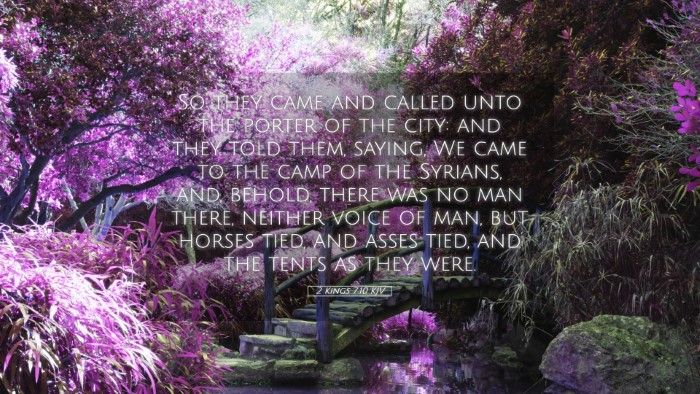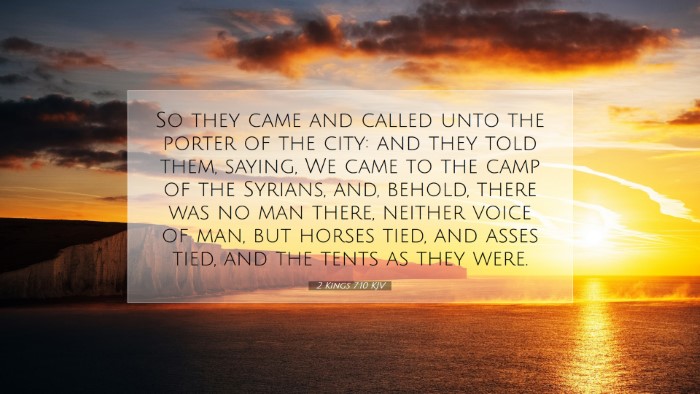Old Testament
Genesis Exodus Leviticus Numbers Deuteronomy Joshua Judges Ruth 1 Samuel 2 Samuel 1 Kings 2 Kings 1 Chronicles 2 Chronicles Ezra Nehemiah Esther Job Psalms Proverbs Ecclesiastes Song of Solomon Isaiah Jeremiah Lamentations Ezekiel Daniel Hosea Joel Amos Obadiah Jonah Micah Nahum Habakkuk Zephaniah Haggai Zechariah Malachi2 Kings 7:10
2 Kings 7:10 KJV
So they came and called unto the porter of the city: and they told them, saying, We came to the camp of the Syrians, and, behold, there was no man there, neither voice of man, but horses tied, and asses tied, and the tents as they were.
2 Kings 7:10 Bible Commentary
Commentary on 2 Kings 7:10
Verse Reference: 2 Kings 7:10 - "So they came and called unto the porter of the city: and they told him, saying, We came to the camp of the Syrians, and, behold, there was no man there, neither voice of man, but horses tied, and asses tied, and the tents as they were."
Introduction
This verse marks a significant moment in the narrative of 2 Kings, revealing God's divine providence in the midst of crisis. The backdrop involves a besieged city, Israel, where famine has taken hold due to the Syrian army's encirclement. A quartet of lepers, excluded from the city due to their illness, embarks on a crucial exploration that leads to unexpected revelation (Henry). Their discovery speaks of not just physical deliverance but serves as a foreshadowing of God's redemptive work.
Contextual Analysis
The context of the chapter centers around the desperate circumstances faced by the people of Samaria. As the narrative unfolds, it shows the profound despair prevalent in the city, where mothers resort to cannibalism due to starvation (Barnes). The lepers, through their encounter with God’s mercy, become agents of hope, signaling a transition from despair to salvation.
Character Analysis
- The Lepers: The lepers represent marginalized individuals in society. Their willingness to venture into the Syrian camp, driven by sheer desperation, symbolizes faith and initiative. In their choice to act, they contrast sharply with the paralyzed fear of the citizens behind the city walls.
- The Porter: The porter, or gatekeeper, serves as a critical link between the lepers and the people of the city. His role reflects a broader theme of communication and discernment, as he processes the shocking news presented to him (Clarke).
Theological Insights
This moment in 2 Kings implies significant theological insights into God's nature and human agency. The outcome, a profound deliverance, showcases God’s sovereignty over circumstances and His ability to act in the most unexpected ways. The lepers’ decision aligns with themes of faith; they stepped out unto the unknown, believing in the possibility of change. Barnes emphasizes that their actions, albeit minor, were instrumental in bringing news of salvation.
Literary Structure
The narrative structure in this passage stands out as unorthodox yet captivating. The action does not take place within the city but rather in the campsite of the enemy. This literary choice augments the theme of divine intervention versus human despair. The stark contrast between the feasting Syrians and the starving Israelites encapsulates the broader human condition, rife with hope amidst despair.
Historical Context and Implications
The historical context of this narrative aligns with the geopolitical tensions of ancient Israel. The Syrian siege serves as an illustration of the turmoil faced by God’s people, illustrating covenant disobedience and the resultant consequences. The lepers’ experience embodies the tension of suffering and the hope of restoration (Henry)—a duality that resonates with audiences throughout history.
Practical Applications
- Faith in Action: The lepers’ movement reflects a broader call to action for believers. It reminds individuals that faith often requires stepping into the unknown, embodying trust in the divine while moving away from fear.
- God’s Providence: The narrative exemplifies that even in dire circumstances, God’s hand is at work. It serves as a source of encouragement for those experiencing trials; deliverance can come from unexpected places.
Conclusion
In the overarching story of 2 Kings 7:10, the complexity of human suffering contrasts with the simplicity of divine provision. The message embedded in this verse speaks to the essence of hope, redemption, and the transformative power of faith. For pastors, students, and theologians alike, this passage serves as a reminder that the least expected individuals (the lepers) can orchestrate the greatest acts of faith. The role of the porter includes not only accepting but effectively communicating this transformative message to a now desperate people. Ultimately, 2 Kings 7:10 is not merely historical; it resonates with timeless truths applicable to the life of the Church today.


